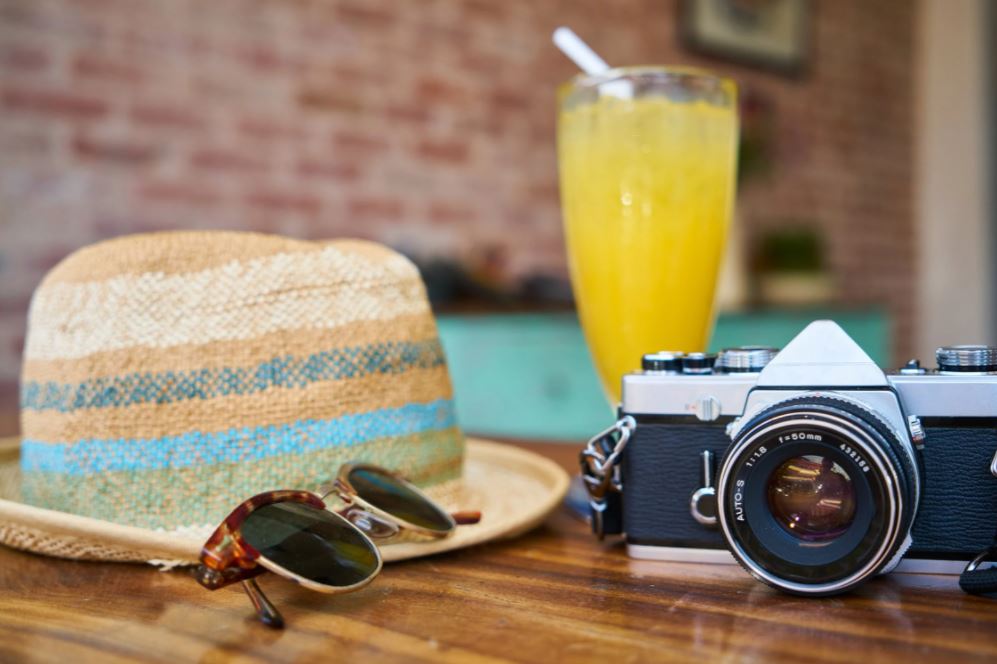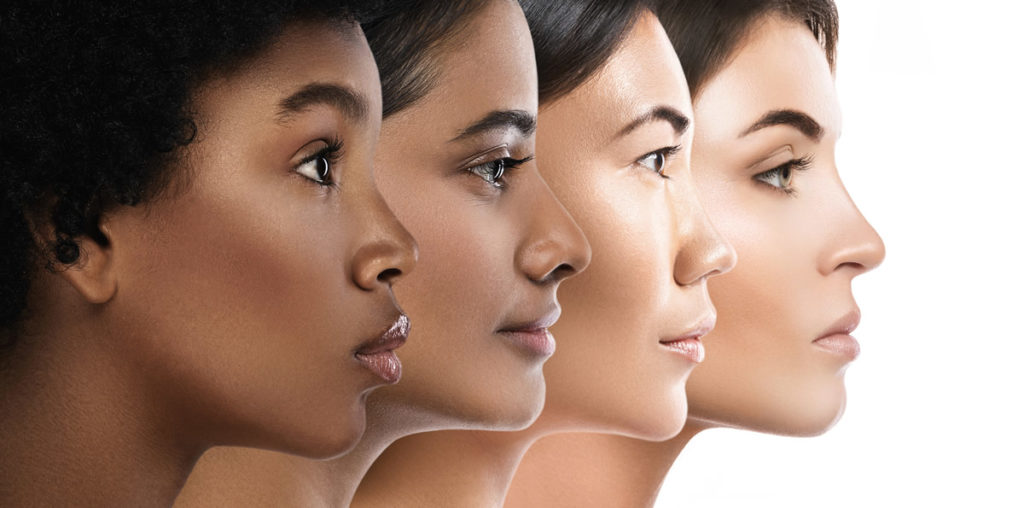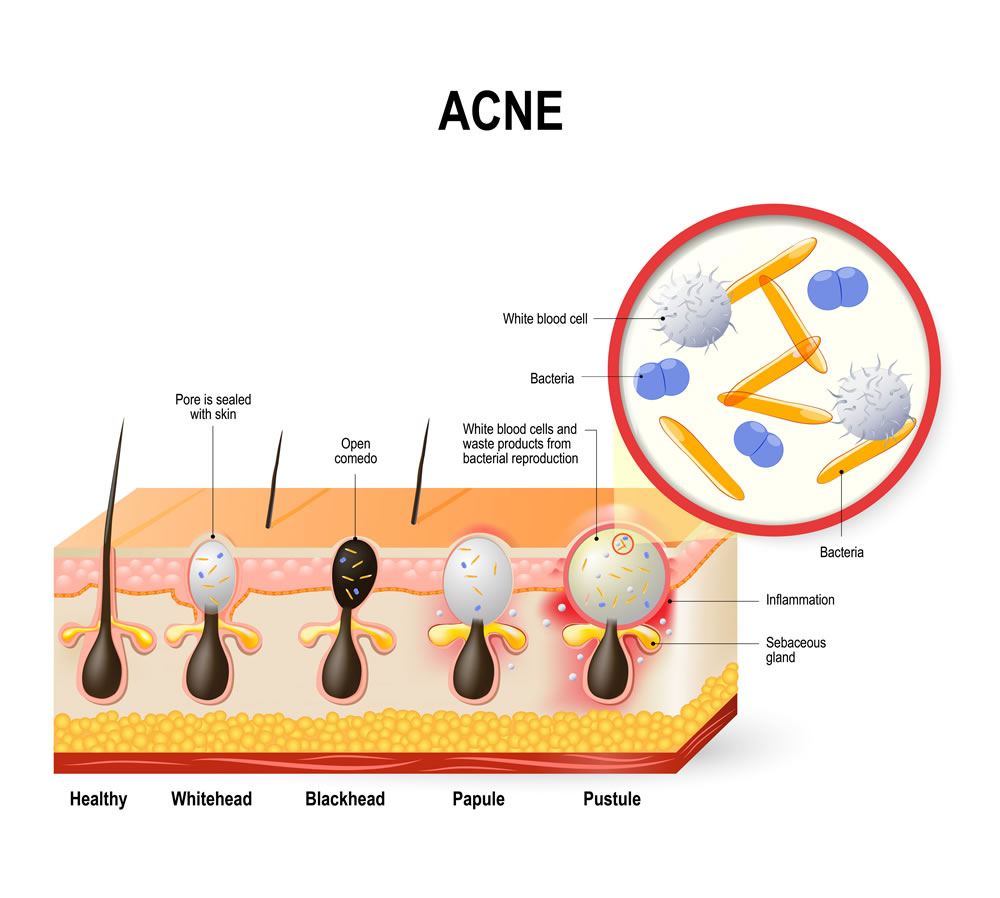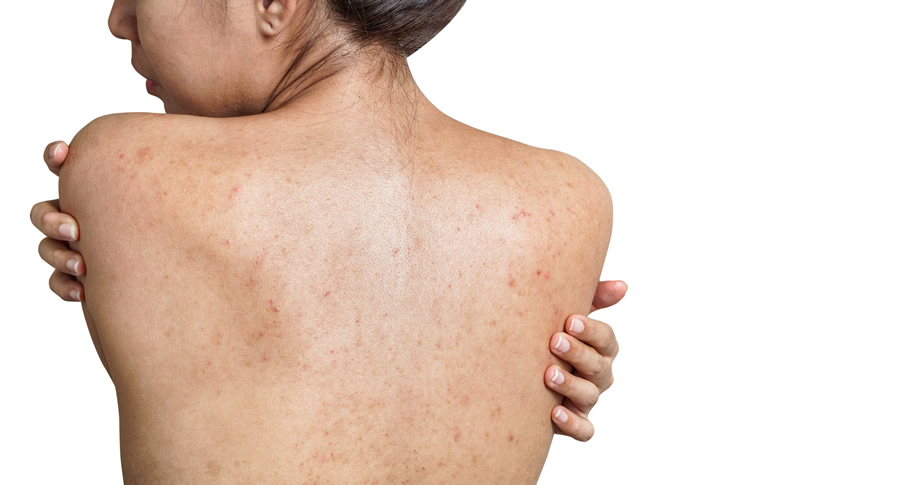Sunscreen for Acne Prone Skin

Everyone understands the importance of applying sunscreen daily to prevent skin cancer and protect against the premature signs of aging. However, when you have oily, acne-prone skin, the idea of slathering a thick, greasy sunscreen on your face might make you cringe. Don’t panic! Applying facial sunscreen to oily skin doesn’t have to end in acne breakouts. In fact, it’s especially important for acne-prone individuals to use sunscreen in order to prevent the development of dark marks and acne scars – and there IS a way to do so that won’t clog pores!
Sun protection is essential for all skin types. Oily skin types may benefit from using a weightless sunblock that helps control excess oil while still providing skin hydration and UV defense. Contrary to what one might think, avoiding sunscreen can actually worsen the appearance of acne! When we get a sunburn, the skin becomes inflamed. Inflammation contributes to worsening acne breakouts and can even create scarring that is often more difficult to manage than the acne itself.
Dr. Michele Green is an internationally renowned expert in cosmetic dermatology with over 25 years of experience in treating patients with sun damage, skin cancer, acne breakouts, acne scars, wrinkles, sun spots, spider veins, and Rosacea. With the most cutting edge cosmetic lasers, the latest dermal fillers like Restylane® and Juvederm®, and constant innovation, Dr. Green is able to improve the tone, texture, and discoloration of your skin. Dr. Green is an expert in treating acne and acne scars, as well as choosing the best skin care for patients with both normal and sensitive skin. Whether it be recommending the best sunscreen, moisturizer, or lotion, for acne-prone skin, or recommending the correct treatment options for acne breakouts or acne scars, Dr. Green is here to help you in her private, discreet dermatology office in NYC.
Why is Daily Sunscreen Use Important?
Exposure to the sun can contribute to the appearance of wrinkles, dark spots, and leads to the formation of skin cancer. Sunscreen can help protect us against premature aging of our skin and development of skin cancers. Using sunscreen is an important skincare step for everyone to adhere to regardless of skin tone, the weather, and the time of year. When choosing a sunscreen, look for one that is broad-spectrum. Broad-spectrum sunscreens are best because they offer protection against both UVA and UVB rays. Generally, an SPF rating of at least 30 is recommended. However, if you have a history of skin cancer, suffer from melasma or hyperpigmentation, or tend to burn quickly, you should consider using a sunscreen with SPF 50 or higher.
The UV rays can penetrate even the deepest layers of the skin and cause changes to DNA at the cellular level. Sun damage affects the aging process of the skin and can result in skin cancer. In order to prevent the long-term negative effects of sun damage like photoaging and skin cancer, as well as the short-term effects like sunburn, it’s important to protect the skin from the sun’s UV rays with a broad-spectrum SPF of at least 30. Sunscreen should be reapplied every two hours when in the sun, and protective clothing and a hat should be worn in addition to sunscreen.

Does Sunscreen Cause Acne?
Sunscreen itself does not cause acne. Finding the right formulation sunscreen for your skin can make all the difference. Acne occurs when the sebaceous follicles of the skin become clogged with debris, sebum, and dead skin cells. If you’re prone to acne, look for a fragrance-free, non-greasy sunscreen lotion (maybe even one with a matte finish) that will hydrate the skin without clogging up the pores.
If you’re dreading the thought of topping your moisturizer with a face sunscreen, look for an ultra-light combination sunscreen lotion. That way, you can eliminate an extra step in your morning skincare routine.
Is sunscreen good for acne?
A noncomedogenic, oil-free, hydrating sunscreen of at least SPF 30 should provide the protection you need against UV rays without exacerbating breakouts. Choosing a sunscreen with calming ingredients such as zinc, white tea, and lactic acid can be soothing for acne-prone skin and help diminish the appearance of blemishes.
Is sunscreen bad for acne?
Using an oily, chemical sunscreen lotion can potentially clog pores, leading to the formation of acne and worsening inflammation of existing acne. Sunscreen itself is not inherently bad for acne. However, different sunscreens are best for different skin types, and certain formulas may lead to an acne breakout for patients with oily or sensitive skin. There are formulas available for all skin types, including acne-prone skin.
What is the best skincare to use to prevent acne-prone skin from breakouts?
There are many different products available for treating acne and it can be a challenge to find what works best for you. Knowing your skin type is the first and most important step in determining which products and ingredients will benefit you most. For acne-prone skin, it’s generally recommended to use a gentle cleanser, twice daily, without intense scrubbing. Scrubbing skin too aggressively can exacerbate skin irritation and worsen inflammation.
Cleansers that are meant to treat acne usually work by gently exfoliating the skin, sloughing off dead skin cells and reducing the presence of bacteria and oil that are causing acne. Some of the most common active ingredients found in acne cleansers are benzoyl peroxide, salicylic acid, and glycolic acid. These ingredients are effective at controlling excess sebum production that contributes to acne.
Benzoyl Peroxide works by targeting and killing the bacteria in the skin that’s clogging the pores. Products containing benzoyl peroxide work best for people suffering from inflammatory acne- pustules, cysts, and nodules. Salicylic acid is a beta hydroxy acid (BHA) that works exceptionally well for treating comedonal acne, blackheads and whiteheads. Salicylic acid is oil-soluble, meaning it can deeply penetrate the skin and dissolve sebum and dead skin cells within clogged pores. Glycolic acid is an alpha hydroxy acid that, like salicylic acid, will gently exfoliate the skin. By removing dead skin cells and oil, preventing clogged pores, glycolic acid can help reveal a more even skin texture and tone and prevent acne. Additionally, glycolic acid will retain moisture in the skin, making it an ideal ingredient for people with acne-prone skin who may find salicylic acid and benzoyl peroxide to be too drying.
For over 25 years, board-certified dermatologist Dr. Michele Green has treated patients in New York with acne and acne scars. She formulated this three-step home acne fighting treatment to help her patients diminish their acne, minimize the appearance of enlarged pores, and achieve clear, beautiful skin. The first step is to cleanse the skin with the pore minimizing cleanser, specifically formatted to clear acne spots and blemishes. Next, the skin can be exfoliated with the retexturizing pads- an acne-fighting blend of glycolic and salicylic acid on a handy, disposable pad that offers at-home peel benefits. Lastly, the acne spot treatment is applied to active pimples. The combined use of these three products is a great way to combat persistent acne and help keep your complexion acne-free and healthy.
Applying a lightweight, oil-free moisturizer and using a high SPF are important steps in a skincare routine when treating acne, particularly when using topical treatments that can make the skin sensitive to sunlight. Patients should pay careful attention to specific product directions to determine when a moisturizer should be applied, as some topical treatments recommend waiting until the product is fully absorbed by the skin before applying any moisturizers.

What are the some of the best sunscreen lotions to use that won’t cause acne breakouts?
EltaMD UV Clear Broad-Spectrum SPF 46 is lightweight, oil-free, and fragrance-free formula that’s perfect for all skin types, including sensitive and acne prone skin. Lactic acid, hyaluronic acid, and niacinamide are included to keep the skin looking and feeling healthy and doesn’t leave behind any residue associated with some mineral-based sunscreens.
Dr. Green’s Hydrating Sunscreen SPF 50 is an ultra-moisturizing formula that uses zinc oxide, Octinoxate, and hyaluronic acid to keep skin well-hydrated and protected from UV rays. The sunscreen forms a protective barrier on skin’s surface to lock moisture in and plump the look of fine lines and wrinkles. The formula also contains caffeine, which, when exposed to UV light has antioxidant properties that help soothe and calm skin.
What are the Best Sunscreens for Sensitive Skin?
Skinceuticals Physical Fusion UV Defense SPF 50 is a mineral option that is fragrance-free and non-comedogenic, formulated with gentle ingredients, meaning even the most sensitive of skin types can use without irritation. This sunscreen has a light texture and is sheer, meaning it won’t leave behind a white cast associated with many other mineral sunscreens.
Origins A Perfect World SPF 40 contains White Tea as an ingredient which is ultra-soothing and works well for sensitive skin types. This product is a combination sunscreen and moisturizer and may be preferred for dry skin.
Which sunscreen is best for acne-prone skin?
When it comes to acne-prone skin, the most important factor is a formulation that will not increase the amount of oil or debris on the surface of the skin. There are a variety of effective sunscreens that can help to protect your face without irritating the skin or clogging pores.
Which SPF-30 sunscreens are recommended for acne-prone skin?
There are several SPF-30 sunscreens that offer non-oily, lightweight protection from UV rays. Popular options include:
- Coola Mineral Face Organic Matte Finish Sunscreen is ultra-light with broad spectrum protection.
- Dermalogica Oil-Free matte SPF 30 sunscreen is an excellent option for patients with oily skin types who are acne-prone
- If you can’t stand the idea of using a sunscreen lotion, Clear Science powder sunscreen has SPF 30, is easy to use, and can be taken on-the-go! The brush-on sunscreen formula has a tint to it and is available in five different shades.
Why choose an SPF 50 sunscreen and which are best to use for acne-prone skin?
Dr. Green recommends that patients use a daily broad-spectrum SPF-50 sunscreen in order to fully protect their skin from damaging sun exposure. A sunscreen of SPF 50 only lets about 2% of the sun’s more harmful UV rays, which protects the skin against a huge range of damaging effects.
Dr. Green has developed two unique SPF 50 sunscreen formulations through her line of skincare products, MGSKINLABS. The Hydrating Sunscreen is designed to help patients with naturally dry skin types, and contains antioxidants and hyaluronic acid to help promote cell turnover. The Advanced Formula Broad Spectrum SPF 50+ Sunscreen is an excellent option for patients with normal-to-oily skin types.
For those who are acne-prone with dehydrated or dry skin, CeraVe Hydrating Sunscreen broad spectrum SPF 50 is a hydrating option that’s packed with ceramides and niacinamide. A sunscreen with an SPF 50 offers extra sun protection and the ingredients in this mineral sunscreen
How to get ride of acne from sunscreen
The best way to reduce acne due to sunscreen use is to switch up the formula of your sunscreen! Try opting for a mineral sunscreen as opposed to a chemical sunscreen. There are even powder sunscreen options available, which means you don’t have to fear clogged pores from a traditional liquid.
Additionally, there are several acne-fighting treatments that can help to heal a breakout caused by sunscreen. The HydraFacial is a medical grade facial that focuses on deeply cleansing, gently exfoliating, and nourishing the skin. Patients who are suffering from acne breakouts greatly benefit from HydraFacials because the process removes congestion from the skin and tightens the pores. Dr. Green recommends the HydraFacial combined with a blue LED light therapy in order to best combat active acne breakouts.
Which is the best sunscreen for oily and acne-prone skin?
If you’re acne-prone and unsure of where to start in terms of finding a sunscreen that works for your skin, try a mineral sunscreen first. Mineral sunscreen works by acting as a physical barrier atop the skin against the sun’s UV rays. Chemical sunscreens actually absorb the UV rays and convert the absorbed energy into heat that is then released. For those who are acne-prone, using a chemical sunscreen may cause irritation and exacerbate any inflammation associated with acne. A mineral/physical sunscreen will be a less irritating option for individuals who have acne, oily skin, or sensitive skin.

Does sunscreen help acne scars?
Using sunscreen on a daily basis can help protect against darkening acne scars which are hyperpigmented or discolored. Additionally, using a Vitamin C serum in tandem with your sunscreen can further protect your skin. Vitamin C is a powerful antioxidant that helps to combat the formation of hyperpigmentation, fine lines, and wrinkles that result from exposure to UV rays. The restorative properties of L-ascorbic acid (the active version of Vitamin C) contribute to the acceleration of collagen and elastin production in the skin.
Dr. Michele Green has formulated a serum with a high concentration of Vitamin C that effectively revitalizes the skin and helps repair damage done by the sun. Using the Vita-C serum morning and night after cleansing will result in skin that looks and feels more radiant, youthful, and healthy.
Which sunscreen is best for Acne-prone Skin?
When it comes to sunscreen for acne-prone skin, there’s no one “best” option; the best sunscreen for you will be one that helps your skin to feel protected and nourished. However, you don’t have to go far to find a sunscreen that will keep you protected from the sun and acne free. Amazon, Ulta, and Dermstore are all great resources when looking to select a sunscreen for acne-prone skin. Here are a few of Dr. Green’s favorites:
- La Roche-Posay has a broad-spectrum SPF 60 sunscreen that is oil-free and absorbs excess oil in the heat and humidity, perfect for people with oily, acne-prone, and sensitive skin. The antioxidants in this sunscreen takes this formula a step further by helping protect the skin against free radical damage from the environment and to keep skin looking and feeling healthy.
- Supergoop makes a water-resistant sunscreen with protection from blue light and is SPF 40.
- EltaMD UV Clear Broad-Spectrum SPF 46 is lightweight, oil-free, and fragrance-free formula that’s perfect for all skin types, including sensitive and acne prone skin. Lactic acid, hyaluronic acid, and niacinamide are included to keep the skin looking and feeling healthy and doesn’t leave behind any residue associated with some mineral-based sunscreens.
- MGSKINLABS Hydrating Sunscreen SPF 50 is an ultra-moisturizing formula that uses zinc oxide, Octinoxate, and hyaluronic acid to keep skin well-hydrated and protected from UV rays. The sunscreen forms a protective barrier on skin’s surface to lock moisture in and plump the look of fine lines and wrinkles. The formula also contains caffeine, which, when exposed to UV light, has antioxidant properties that help soothe and calm skin.
Why is sunscreen important for acne?
Sunscreen is important for acne-prone individuals because the UVA and UVB rays from the sun can make areas of hyperpigmentation more noticeable, acne scars less likely to fade, and can cause further acne breakouts due to increased debris on the surface of the skin. Though a summer tan can often convince patients that unprotected skin in direct sunlight reduces acne breakouts, too much sun exposure is much more likely to inflame an acne breakout, and a tan will only temporarily mute the color of reddened pimples on the skin. Sunscreen is helpful in not only preventing acne breakouts, but also protecting the skin against premature aging, pigmentation, and cancer.
Can sunscreen prevent acne?
Though sunscreen is not designed to treat the appearance of acne on the skin, daily use of sunscreen can prevent acne from developing due to sun overexposure. Additionally, some formulations of sunscreen include ingredients which are beneficial for overall skin health such as hyaluronic acid, lactic acid, niacinamide, ceramides, and antioxidants. Choosing a sunscreen with acne-fighting ingredients can help prevent the development of acne. Lactic acid is a gentle exfoliating ingredient that is incorporated into some sunscreens such as Elta MD UV Clear and La Roche Posay Anthelios Clear Skin Face Sunscreen.
Is zinc sunscreen good for acne?
Zinc is an inherently anti-inflammatory and anti-microbial ingredient. When applied topically to acne, it can help reduce the number of acne-causing bacteria and soothe inflammation associated with acne. Products (like sunscreen) that include zinc can be a calming part of your skincare routine while experiencing a breakout, but won’t be effective at eliminating acne on their own. Zinc oxide has the potential to enhance the effects of other acne-fighting ingredients, like salicylic and glycolic acids, though you should not rely solely on zinc oxide in your sunscreen to treat your acne. This is why MGSKINLABS Hydrating Sunscreen SPF 50 is a go-to for many of Dr. Green’s patients.
Is mineral sunscreen better for acne?
Chemical and mineral sunscreens will both work to protect against UV rays. However, ingredients used in chemical sunscreens may be irritating to acne-prone skin. Both chemical and mineral sunscreens are deemed safe and effective to protect skin, though individuals who suffer from acne may find that mineral sunscreens are more comfortable to wear than chemical sunscreens.
What’s the difference between mineral sunscreens and chemical sunscreens?
The biggest differences between mineral and chemical sunscreens are the active ingredients and the mechanisms by which they protect against UV rays. Mineral sunscreens use ingredients such as zinc oxide and titanium dioxide that sit on the surface of the skin, acting as a physical barrier against the sun’s rays. A chemical sunscreen absorbs into the skin, penetrating on a deeper level than a mineral sunscreen. Chemical sunscreens contain chemical ingredients like oxybenzone, avobenzone, octisalate, octocrylene, homosalate and/or octinoxate. The ingredients in chemical sunscreens react with UV rays, turning them into heat that is then released by the body. Additionally, mineral sunscreens are more likely to be mattifying and leave behind a white cast though they may be more comfortable as far as reapplication. For darker skin tones, choosing a mineral sunscreen with a tint can help prevent appearance of a white cast.

Popular Sunscreen Options for Acne-Prone Skin
There are several popular sunscreen brands that are all designed to protect the skin from harmful UV rays while simultaneously keeping pores clear and hydrated. Here are several options that can be found in a variety of drugstores and online marketplaces:
Anthelios Sunscreens
La Roche Posay Anthelios 50 Mineral is a mineral sunscreen with a matte finish, meaning it has the potential to sit beautifully underneath makeup. This can be a big bonus for many women considering how essential it is to apply sunscreen daily. This sunscreen is formulated with nourishing and protecting antioxidants that keep the skin looking and feeling healthy and offers defense against UVA and UVB rays.
Anthelios Light Fluid Face Sunscreen SPF 60 is non-comedogenic and lightweight sunscreen with a matte finish. Its formulation features revitalizing antioxidants as well as broad-spectrum UV protection which is an excellent option for combination skin.
Cerave sunscreens
The Cerave Ultra-light Moisturizing Lotion SPF 30 is a great pick for oily skin types. This will provide you with the hydration you need without leaving skin feeling greasy. This is a chemical sunscreen, though it does incorporate ingredients that can help soothe irritation from acne such as hyaluronic acid and ceramides.
Cerave Hydrating Mineral Sunscreen SPF 50 Face Lotion has a 100% mineral, oil-free formulation that relies on titanium dioxide and zinc oxide to form a protective barrier on the surface of the skin. Additionally, this sunscreen touts three ceramics to hydrate the dermis, as well as restore the skin’s barrier.
Neutrogena Sunscreens
Neutrogena Sheer Zinc SPF 50 is also broad spectrum and the formula is hypoallergenic as well as dry-touch. This means that the sunscreen won’t leave behind an oily feel and that it will be gentle enough to use on sensitive skin types.
Clear Face Liquid Lotion Sunscreen SPF 55 is a matte-finish sunscreen that won’t clog the pores and is water resistant! If you plan on some outdoor activities over the summer, this chemical sunscreen may be right for you.
Can not wearing face sunscreen cause acne breakouts?
The appearance of acne can be worsened by avoiding sunscreen, and free radicals from the environment can more easily cause damage to skin tissue, increasing the likelihood of developing a skin cancer or contributing to the signs of premature aging. For this reason, Dr. Green always recommends that patients rely on a daily sunscreen, regardless of their skin condition.
How can I tackle acne breakouts and acne scars today?
Dr. Michele Green is a board-certified cosmetic dermatologist with over two decades of experience in helping patients treating all of their skin concerns, including acne, acne scarring, hyperpigmentation, melasma, sun damage, wrinkles, skin laxity, sun spots, among other cosmetic concerns, in her private, boutique, NYC office. Dr. Green is consistently voted as one of the best dermatologists in New York by New York Magazine, Castle Connolly, Super Doctors, and The New York Times. Whether it be the best Botox® injections in Manhattan, or the best skin tightening with Thermage FLX, Dr. Green will help you restore and rejuvenate your skin with no down time. Please contact our NYC based office today or call 212-535-3088 to schedule a consultation with Dr. Green and learn which treatments are best for you.
 212-535-3088
212-535-3088